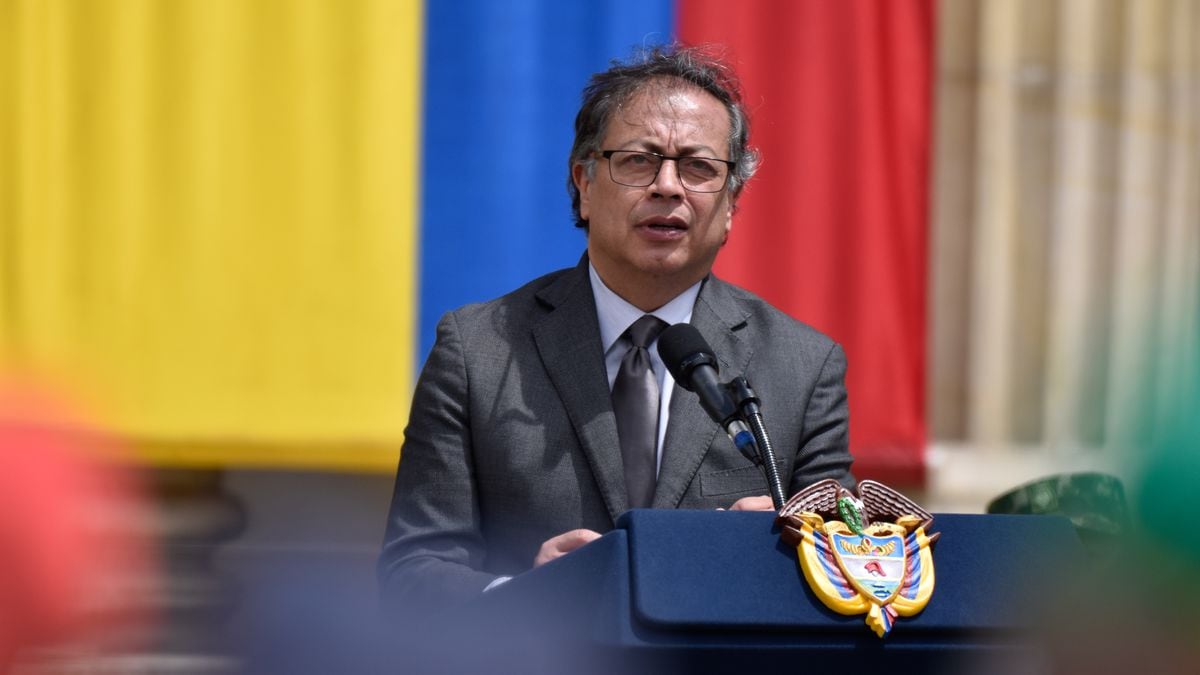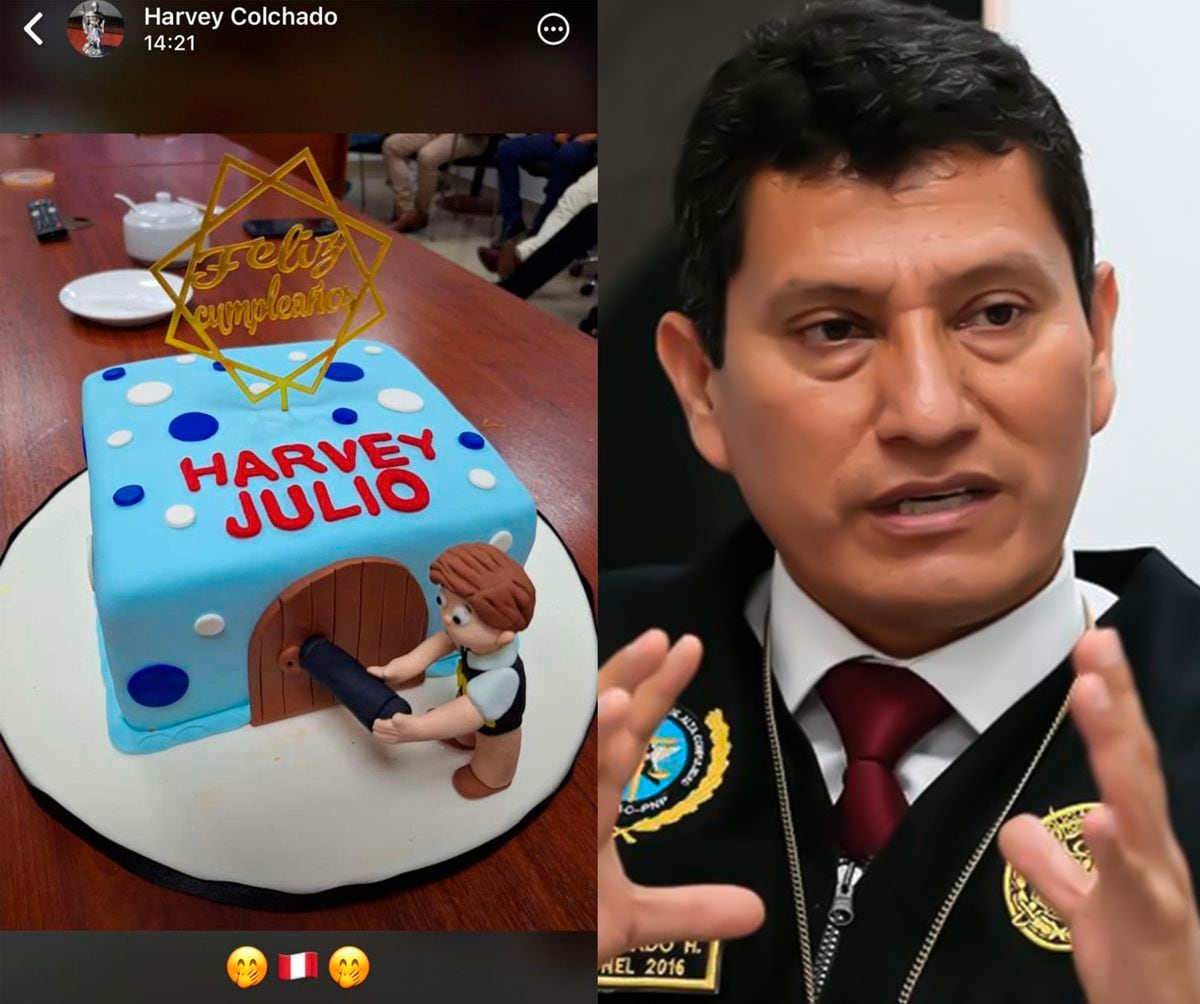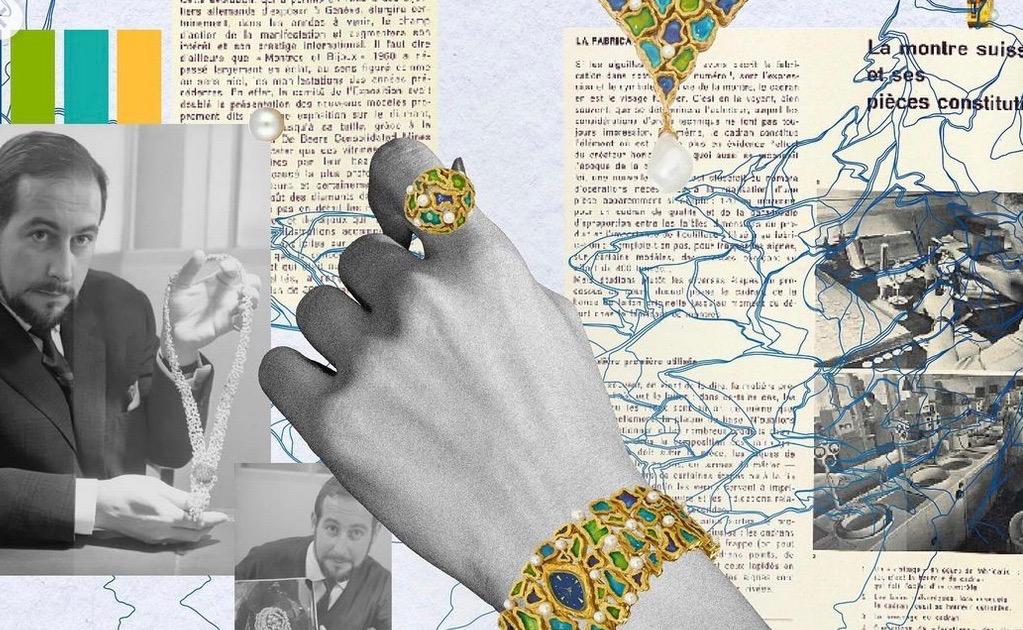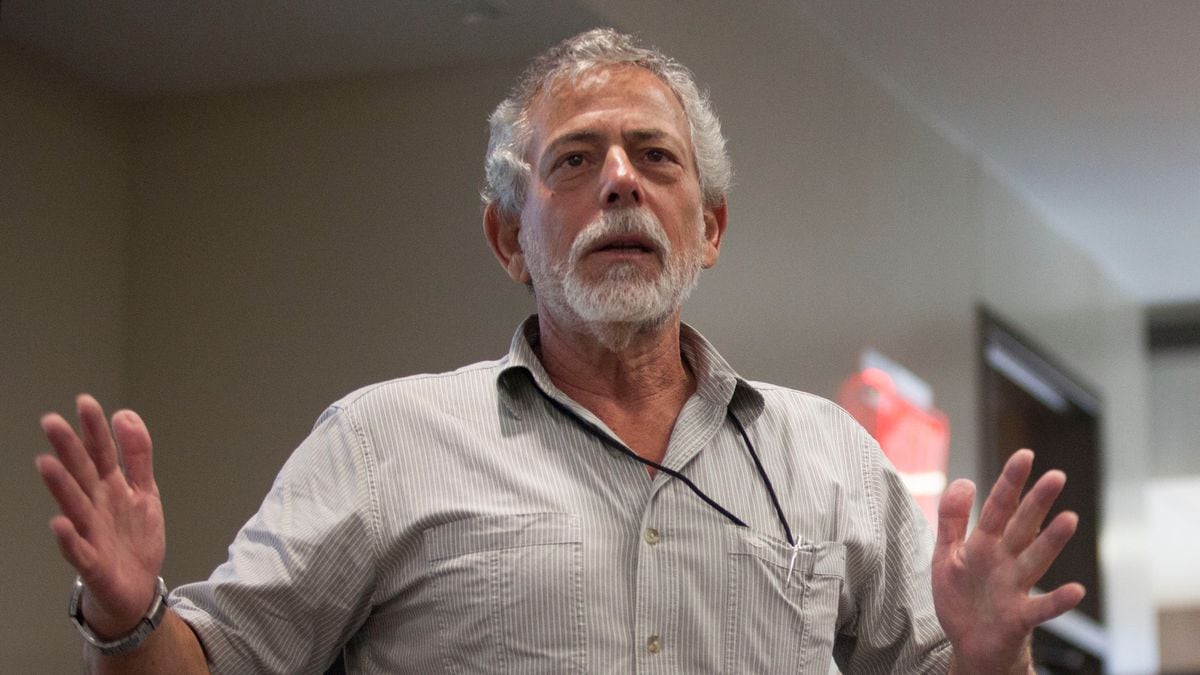When the camera began to broadcast to the entire nation, Pedro Castillo appeared in the frame.
He began to read, almost like a robot, some papers that he held in his hands, which began to tremble as he progressed in reading.
The president of Peru was announcing the dissolution of Congress and a state of emergency.
His nervousness was evident.
Those who saw it on television could not believe that the school teacher from the Andes was carrying out a self-coup.
Hours later, he was arrested when he was going to take refuge in the Mexican embassy and ended up sitting on a leatherette sofa in a Lima police station while leafing through a magazine.
The Congress that wanted so badly to get rid of him removed him.
Peruvian justice accuses him of rebellion and other crimes that could send him to prison for decades.
The lawyer shows the letter that Pedro Castillo sent from prison.
Diego Cuevas
Castillo has put his defense in the hands of Leonardo Croxatto, a young Argentine lawyer.
Two days ago they gave him a letter written by the former president in his own handwriting from prison so that he could deliver it by hand to Gustavo Petro in Bogotá, and he did so on Thursday.
Hours later, he looks splendid in a hotel in the center of Bogotá, where he rests for a while before catching a flight to Buenos Aires.
He hasn't slept for 48 hours.
When he entered Petro's office he was wearing his tie, but when he saw that his neck was bare he took it off and left it on the table.
They both laughed.
Croxatto maintains that Castillo's message that December 7 was rather symbolic, a response to the attacks he received from the opposition.
There were no tanks or rifles to support his coup, there was nothing prepared or studied.
It was the complete opposite of a master plan, an almost theatrical performance.
He will shortly request an amparo from the Peruvian Constitutional Court to release him from the maximum security prison in which he is being held.
Ask.
What did Castillo's address to the nation mean to you?
Ask.
The message to the nation has a series of formalities.
To be a formal one, it must be signed by the entire council of ministers.
This speech had no signature.
It is illegal to prosecute ministers who did not sign the speech as participants in a crime of conspiracy.
If you analyze from the right the events that happened in Peru, you will see that they fall one by one.
The flagrancy falls, the rebellion falls, the conspiracy falls.
The formal requirements are not met.
What there was in any case is a constitutional violation, which has a regulated procedure and that procedure was not complied with by Congress.
Only in Peru can something like this happen.
What they did is a constitutional hogwash.
Q.
Why do you consider the procedure against Castillo unconstitutional?
R.
They charge you with a crime of rebellion, which in the Peruvian penal code is uprising with weapons.
Here there was no uprising with weapons.
The only weapons were against Castillo.
He didn't have any power.
Some say that at best it was an inappropriate attempt, because he tried to carry out a coup, although I do not support that theory.
He didn't make it because there was never a weapon in favor of any coup.
The other crime is conspiracy, but conspiracy is two or more.
Here he is alone, no one knew what he was going to read.
The only blow was given to him, who ends up dismissed.
It is not a blow, it is an atypical fact.
Q.
In what sense?
R.
In that it is not a crime.
It is a constitutional violation.
Q.
So what did you want?
Q.
The truth is that I talked a lot with Petro about what Castillo wanted to do.
I asked him because it was a question we had.
He said interesting things.
He told me that of the seven speeches he had he read the softest.
There is something interesting in Castillo.
He thinks that he represents the native peoples, the peasants.
He didn't want to give his speech to the lawyers to tell him that he might be wrong, he just read it.
It was a speech that brought him closer to the popular bases, to the people, as he says.
By not giving it to the rest of the ministers, it was a political bet of his.
I think he read it because the pressure from the opposition was such -how they had been cornering him, they had sent his daughter to prison-, the degree of persecution was such that I think he gave that speech as a political proclamation before retiring.
It gives me that impression.
Q.
Did you have the support of someone, had you prepared something?
R.
No, I was not thinking in institutional terms.
He talks about the town all the time.
Nothing of what he said was instrumentalized.
He says that it is what the people asked of him and that he complied with the people.
Q.
I had not even spoken to anyone from the Armed Forces...
A.
Obviously, no.
It has something naive and interesting at the same time.
At some point I justify Castillo's disorder and that perhaps it is something too advanced for this historical moment and we are not capable of understanding it.
He did something that broke the logic of colonization, of Eurocentrism, of legal formalism.
He strayed from a legal logic.
That is why I defend that he did not give the speech to the lawyers.
Q.
You would have avoided the situation you are in.
R.
For me it was fine.
Today he is paying for that mistake, but it is interesting because he says that the people gave him that speech.
Why are they going to review it to be censored and corrected?
Who are the Palacio lawyers to tell me what I can or cannot say?
He could not limit the voice of the people.
This is a very complex academic problem that is going to cause a lot of discussion, not now, but it is part of a new phenomenon.
Q.
Let's put ourselves in that December 7, 2022. Castillo gives that speech, the nation is in
shock
.
Let's get that they don't stop him.
How would events have unfolded?
Would he have become an autocrat?
R.
What should have happened according to the Constitution is an accusation for constitutional violation.
There is a procedure established in the Peruvian legal system for these cases and the president would have had the right to present his reasons in Congress and that institution could dismiss him, investigate him, accuse him.
That would have been correct.
Q.
Who wrote the seven speeches for you?
R.
The popular bases, the people as Castillo says.
Eight million Peruvians should be charged with conspiracy.
Here the border between politics and law is blurred.
Q.
When you were arrested, were you going to take refuge in the Mexican embassy?
R.
No, he was going to come back.
He was going to take the daughters.
They accused him of flagrante delicto, but he fell because they didn't arrest him at the scene, they arrested him by order.
And running away is not a crime.
Q.
There was talk that at the time of the reading he was not with his full mental faculties.
R.
False, stupid.
I asked him a month ago and he, very sure of himself, told me that he evidently knew what he was doing.
I felt bad for asking him.
I read the smoothest speech, he told me he.
Imagine the other speeches.
In any case, they accused him of rebellion and the rebellion fell.
That's why now the prosecution is worried about inventing another crime because they know that technically this falls.
Those of us who are lawyers know that what they did to Castillo is wrong.
P.
Castillo accuses the national prosecutor of inventing crimes.
R.
The prosecutor knows that this is a legal trick that would not happen in Europe, neither in Colombia nor Argentina.
She is worried about charging him with another quick crime to justify pretrial detention from another place.
Now she wants to impute him for appointing a minister, for criminal organization.
We believe that the criminal organization is the figure that judges use to prosecute all the center-left leaders in Latin America.
That is lawfare or judicial persecution.
It was done against Correa in Ecuador, against Evo Morales in Bolivia, against Cristina Kirchner in Argentina, Lula in Brazil.
It is done with Castillo in Peru.
When you distort the impartiality of justice, the judges end up doing politics.
Q.
So you consider that Castillo has no responsibility.
R.
Regardless of what one thinks about Castillo, whether he is good or bad, from the left, from the right or ultra-communist, even if he was wrong, the important thing is that the procedure is incorrect.
I'm his lawyer, but I'm not a fool.
What is irregular is the procedure that Congress applied to remove him.
It applies a moral vacancy that was not the corresponding procedure.
The vacancy is racist and was used to criminalize indigenous people.
It comes from mental incapacity and they use it to incapacitate a teacher who represents indigenous people.
104 votes were needed and the Peruvian Congress had 101. It also failed to meet the number of votes needed.
And they did not give him the right to speak in Congress, everything is wrong.
The Peruvian State is going to be condemned in a few months by some serious instance.
Q.
What is the scenario you imagine if that happens?
R.
_
Reinstate Castillo and follow the correct procedures.
Then, that Congress can suspend, disqualify, remove... it can do whatever it wants.
But all that comes after a correct procedure.
Due process was not respected.
The dismissal is illegitimate.
That is why Petro says today the president of Peru, Pedro Castillo.
He doesn't just say it because he supports him politically.
He says it because he heard these technical arguments.
They would be giving the coup to Castillo.
Since he is a poor cholo from the mountains, since the 60 dead are indigenous people from Puno and Ayacucho, the media did not say much about it.
If there were 60 murdered in Miraflores [a wealthy neighborhood] it would be an international scandal.
In any case, Dina Boluarte has to resign.
Q.
How is Moral Castle?
R.
I saw it well, whole, sure.
He entrusted me to meet with Petro, with Evo Morales, with Lula and with the Pope, which I am going to do in ten days.
Q.
Castillo's presidency was very eventful and chaotic, but no one foresaw such an end.
R.
From the first day they made life impossible for him.
They wanted to remove him, 140 bills did not vote for him.
And this year the 30-year concessions from the Fujimori era for all Peruvian natural resources expired.
They have to be renewed this year and he had already announced that he was not going to renew them.
With which the natural resources companies wanted another interlocutor, Castillo was of no use to them.
Q.
How did your meeting with Petro go?
A.
Wonderful.
I confirmed something I suspected: Petro is today the most prepared president in Latin America.
He can go from anthropology to constitutional law with no problem.
He can talk to you about political economy or international finance very solidly and that is something not very common.
I saw him eager to internalize the political and legal situation of Pedro Castillo.
The same position held by López Obrador, Boric, Arce, Evo Morales and Correa.
I highlight Petro's lucidity, those who take the first steps like him are usually those who anticipate a phenomenon.
Follow all the international information on
and
, or in
our weekly newsletter
.


/cloudfront-eu-central-1.images.arcpublishing.com/prisa/CNZG5EUKYXFP3K7LCFCWHXS3VE.jpg)
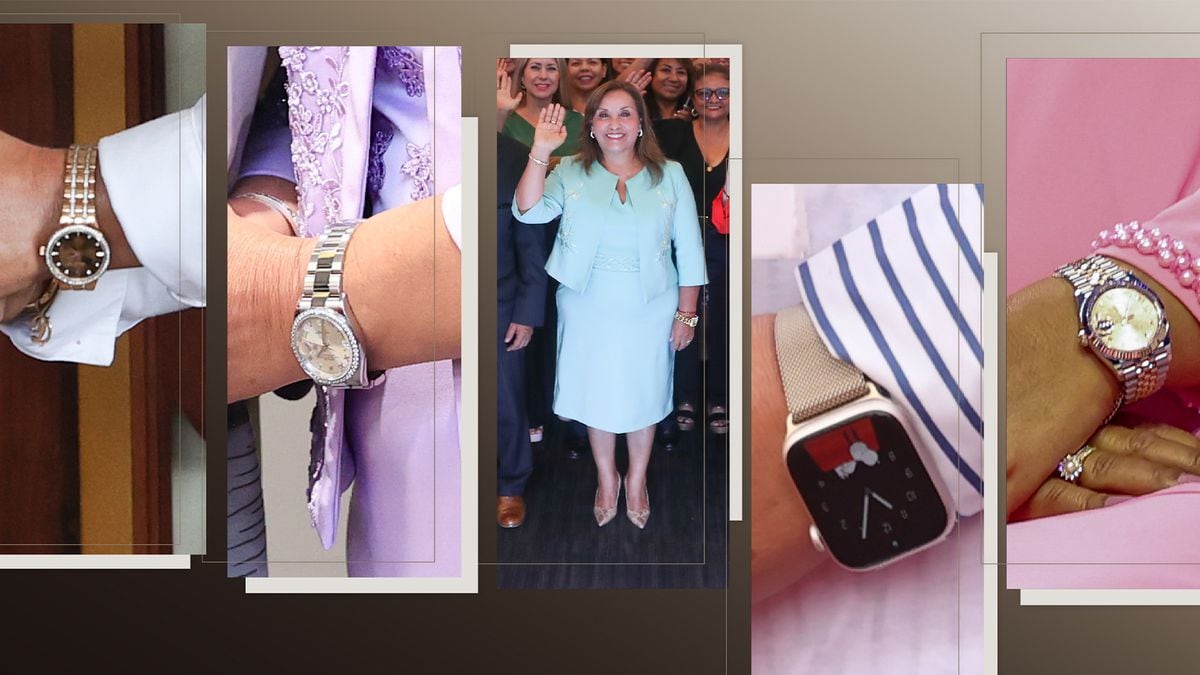
/cloudfront-eu-central-1.images.arcpublishing.com/prisa/PQLA3LJSLI4GET4EDQ5GDQ7JYY.jpg)
